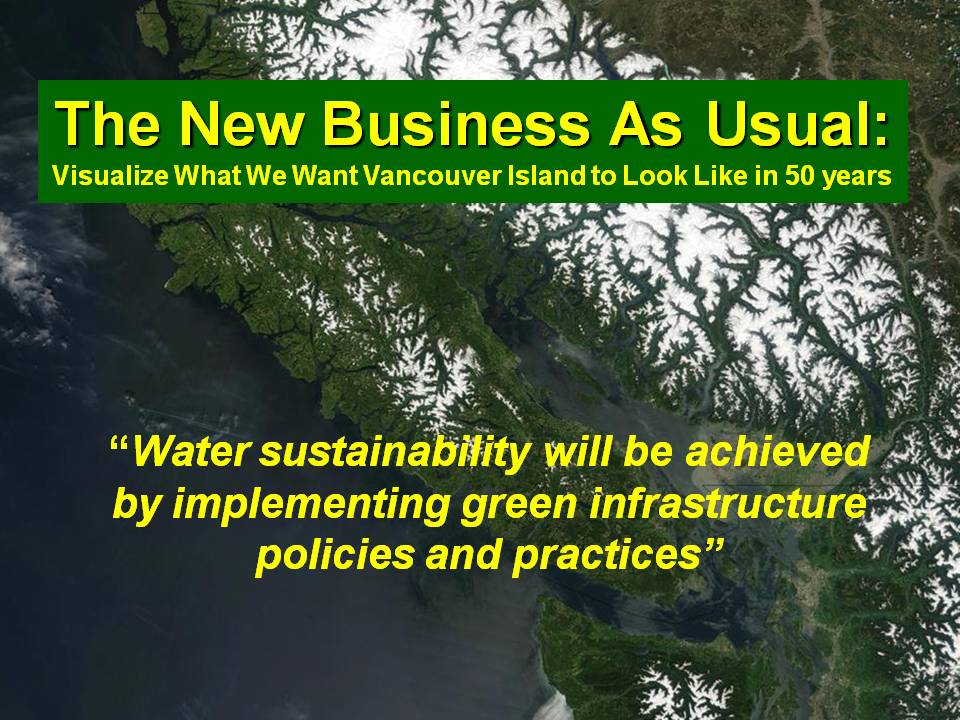GETTING AHEAD OF THE WAVE: Curriculum for 2009 Comox Valley Learning Lunch Seminar Series was guided by the vision for “Living Water Smart & Building Greener Communities: Implementing a ‘regional team approach’ in British Columbia”

What is a ‘Regional Team Approach’?
A regional team approach is founded on partnerships and collaboration; and seeks to align actions at three scales – provincial, regional and local. The key word is alignment: this is what we want to collectively achieve, and this is how we will work together to get there. Under the umbrella of the Water Sustainability Action Plan for British Columbia:
- The ‘regional team approach’ had its genesis in the 2008 Vancouver Island Learning Lunch Seminar Series, organized by Convening for Action on Vancouver Island (which is known by the acronym CAVI) in collaboration with Cowichan Valley and Comox Valley local governments.
- The ‘regional team approach’ was then introduced to the Metro Vancouver region at the 2009 Surrey Water Balance Model Forum, organized by the Inter-Governmental Partnership in collaboration with the City of Surrey and the Green Infrastructure Partnership.
- The ‘regional team approach’ was subsequently showcased provincially at the 2009 Penticton Forum, organized by the BCWWA Water Sustainability Committee in collaboration with the Okanagan Basin Water Board and three provincial Ministries (Community & Rural Development, Agriculture & Lands, and Environment).
 “The shared vision is to control our destiny and create a legacy for our children and grand-children,” states Kim Stephens, Program Coordinator for the Water Sustainability Action Plan. “Having a shared vision means that we will visualize what the regions of British Columbia can look like in 50 years, and today we will set in motion actions that will ripple through time to produce that future.”
“The shared vision is to control our destiny and create a legacy for our children and grand-children,” states Kim Stephens, Program Coordinator for the Water Sustainability Action Plan. “Having a shared vision means that we will visualize what the regions of British Columbia can look like in 50 years, and today we will set in motion actions that will ripple through time to produce that future.”
Ten Cascading Goals
The goals of the ‘regional team approach’ are cascading; and are synthesized from high-level to ground-level as follows:
- Align local actions with policy goals in the Province’s Living Water Smart, BC’s Water Plan and Green Communities Initiative.
- Integrate land and water resource management to balance settlement change and ecology, and to adapt to climate change.
- Make green choices that are cumulative in creating liveable communities, reducing wasteful water use, and protecting stream health.
- Design with Natureto influence the form and function of the human-altered environment.
- Advance Green Infrastructure policies and practices that achieve Water Sustainabilityover time.
- Establish consistent expectations as to what integrated green infrastructure solutions look like on the ground.
- Move from pilot projects to a watersheds objectives approach to get to the big picture – that is, what we want our regions to look like in 50 years.
- Encourage Green Valuedevelopment – that is, the right development in the right place at the right time.
- Provide practitioners with the tools and experience to implement An Integrated Watershed Approach to Settlement.
- Promote Shared Responsibility – all the players work together more effectively, using law reform and/or other process changes as tools.
 “We are NOT saying that every community must follow the same formula; what we are saying is that everyone needs to agree on expectations and how all the players….regulators, developers, designers, etc….will work together, and after that each community can reach its goals in its own way,” states Eric Bonham, Chair of the Highlands Stewardship Foundation and a founding member of the CAVI Leadership Team; and formerly a Director in the Ministry of Municipal Affairs.
“We are NOT saying that every community must follow the same formula; what we are saying is that everyone needs to agree on expectations and how all the players….regulators, developers, designers, etc….will work together, and after that each community can reach its goals in its own way,” states Eric Bonham, Chair of the Highlands Stewardship Foundation and a founding member of the CAVI Leadership Team; and formerly a Director in the Ministry of Municipal Affairs.
The Collaboration Challenge
The following challenge statement frames the learning outcomes for local governments when convening for action:

In rising to the foregoing challenge, the essence of the regional team approach is that all the players will set their sights on the common good and challenge the old barriers of jurisdictional interests. To achieve the common good, this ultimately requires bringing together:
- Local government– those who plan and regulate land use;
- Developers– those who build;
- The Province– those who provide the legislative framework;
- Universities and colleges– those who provide research; and
- The stewardship sector – those who advocate conservation of resources.
Commencing in 2007, Vancouver Island has been the pilot region for regional team-building through collaboration and education. Living Water Smart and the Green Communities Initiative together provide the provincial context for curriculum development and learning outcomes.
The New Business As Usual
“ We are using the slogan The New Business As Usual to convey the message that, for change to really occur, practices that until now have been viewed as the exception must become the norm moving forward. We have to build regulatory models and develop models of practice and expertise to support The New Business As Usual”, stated Dale Wall, Deputy Minister (Community & Rural Development), at the Gaining Ground Summit in May 2008.
We are using the slogan The New Business As Usual to convey the message that, for change to really occur, practices that until now have been viewed as the exception must become the norm moving forward. We have to build regulatory models and develop models of practice and expertise to support The New Business As Usual”, stated Dale Wall, Deputy Minister (Community & Rural Development), at the Gaining Ground Summit in May 2008.
To Learn More:
To hear what Dale Wall had to say, watch the YouTube video of his announcement at the Gaining Ground Conference.


